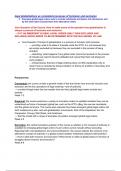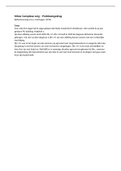Samenvatting
Extensive Advanced Philosophy Summary for final Exam (2023)
- Instelling
- Tilburg University (UVT)
This document is a very extensive summary of the course, containing all readings, tutorial notes and lecture notes are merged. The document starts with an overview of the concepts and definitions and is divided in 5 modules (12 weeks). 1. The historical context of the globalisation of inclusion a...
[Meer zien]







